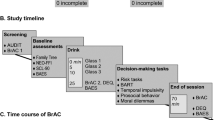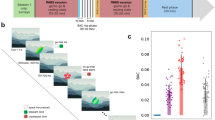Abstract
The per se limit for alcohol intoxication in the USA is a blood alcohol concentration (BAC) of 80 mg/100 ml. However, there is abundant evidence that skilled performance (e.g., information processing, motor coordination) is impaired at BACs well below this limit. By contrast, less is known regarding low-dose alcohol effects on impulsivity-related behaviors, including inhibitory control, delay discounting, and risk-taking. Here, we review the evidence to date regarding performance on behavioral impulsivity and decision-making tasks at BACs below the 80 mg/100 ml limit. Overall, below-limit doses of alcohol impair inhibitory control and increase risk-taking but do not affect delay discounting. Within each facet, alcohol effects were largely task-dependent. We discuss the results in relation to above-limit alcohol effects on these measures, as well as implications of these findings in terms of disadvantageous behavior at BACs below the legal level of intoxication.
Similar content being viewed by others
References
Papers of particular interest, published recently, have been highlighted as: • Of importance
Moskowitz H, Robinson C. Effects of low doses of alcohol on driving-related skills: a review of the evidence. Washington, D.C: U.S. Dept. of Transportation; 1988.
Holloway FA. Low-dose alcohol effects on human behavior and performance: a review of post-1984 research. Springfield: U.S. Dept of Transportation; 1994.
Holloway FA. Low-dose alcohol effects on human behavior and performance. Alcohol Drugs Drive. 1995;11:39–56.
Martin TL, Solbeck PA, Mayers DJ, Langille RM, Buczek Y, Pelletier MR. A review of alcohol-impaired driving: the role of blood alcohol concentration and complexity of the driving task. J Forensic Sci. 2013;58(5):1238–50. This review highlights recent evidence of alcohol-induced impairment of driving ability and driving-related skills at BACs below the 80 mg/100 ml limit.
Moeller FG, Barratt ES, Dougherty DM, Schmitz JM, Swann AC. Psychiatric aspects of impulsivity. Am J Psychiatry. 2001;158(11):1783–93.
de Wit H. Impulsivity as a determinant and consequence of drug use: a review of underlying processes. Addict Biol. 2009;14(1):22–31.
Perry JL, Carroll ME. The role of impulsive behavior in drug abuse. Psychopharmacology. 2008;200(1):1–26.
Weafer J, Mitchell SH, de Wit H. Recent translational findings on impulsivity in relation to drug abuse. Curr Addict Rep. 2015;1(4):289–300.
Fillmore MT. Drug abuse as a problem of impaired control: current approaches and findings. Behav Cogn Neurosci Rev. 2003;2(3):179–97.
Lyvers M. “Loss of control” in alcoholism and drug addiction: a neuroscientific interpretation. Exp Clin Psychopharmacol. 2000;8(2):225–49.
Logan GD, Schachar RJ, Tannock R. Impulsivity and inhibitory control. Psychol Sci. 1997;8:60–4.
Dougherty DM, Mathias CW, Marsh DM, Jagar AA. Laboratory behavioral measures of impulsivity. Behav Res Methods. 2005;37(1):82–90.
de Wit H, Crean J, Richards JB. Effects of d-amphetamine and ethanol on a measure of behavioral inhibition in humans. Behav Neurosci. 2000;114(4):830–7.
Reynolds B, Richards JB, de Wit H. Acute-alcohol effects on the experiential discounting task (EDT) and a question-based measure of delay discounting. Pharmacol Biochem Behav. 2006;83(2):194–202.
Caswell AJ, Morgan MJ, Duka T. Acute alcohol effects on subtypes of impulsivity and the role of alcohol-outcome expectancies. Psychopharmacology. 2013;229(1):21–30. This study demonstrated differential effects of alcohol on inhibitory control (dose-dependent impairment) and delay discounting (no impairment).
Dougherty DM, Marsh-Richard DM, Hatzis ES, Nouvion SO, Mathias CW. A test of alcohol dose effects on multiple behavioral measures of impulsivity. Drug Alcohol Depend. 2008;96(1–2):111–20.
Guillot CR, Fanning JR, Bullock JS, McCloskey MS, Berman ME. Effects of alcohol on tests of executive functioning in men and women: a dose response examination. Exp Clin Psychopharmacol. 2010;18(5):409–17.
Reed SC, Levin FR, Evans SM. Alcohol increases impulsivity and abuse liability in heavy drinking women. Exp Clin Psychopharmacol. 2012;20(6):454–65. This study demonstrated differential effects of alcohol in women. Inhibitory control showed dose-dependent impairment, while delay discounting and risk-taking were not significantly impaired at low or high doses.
Ramaekers JG, Kuypers KP. Acute effects of 3,4-methylenedioxymethamphetamine (MDMA) on behavioral measures of impulsivity: alone and in combination with alcohol. Neuropsychopharmacology. 2006;31(5):1048–55.
Newman JP, Widom CS, Nathan S. Passive avoidance in syndromes of disinhibition: psychopathy and extraversion. J Pers Soc Psychol. 1985;48(5):1316–27.
Fillmore MT, Rush CR, Marczinski CA. Effects of d-amphetamine on behavioral control in stimulant abusers: the role of prepotent response tendencies. Drug Alcohol Depend. 2003;71(2):143–52.
Marczinski CA, Fillmore MT. Preresponse cues reduce the impairing effects of alcohol on the execution and suppression of responses. Exp Clin Psychopharmacol. 2003;11(1):110–7.
Marczinski CA, Abroms BD, Van Selst M, Fillmore MT. Alcohol-induced impairment of behavioral control: differential effects on engaging vs. disengaging responses. Psychopharmacology. 2005;182(3):452–9.
Fillmore MT, Ostling EW, Martin CA, Kelly TH. Acute effects of alcohol on inhibitory control and information processing in high and low sensation-seekers. Drug Alcohol Depend. 2009;100(1–2):91–9.
Weafer J, Fillmore MT, Milich R. Increased sensitivity to the disinhibiting effects of alcohol in adults with ADHD. Exp Clin Psychopharmacol. 2009;17(2):113–21.
Weafer J, Fillmore MT. Comparison of alcohol impairment of behavioral and attentional inhibition. Drug Alcohol Depend. 2012;126(1–2):176–82. This study showed dose-dependent impairment of manual and ocular response inhibition following low and high doses of alcohol.
Ortner CN, MacDonald TK, Olmstead MC. Alcohol intoxication reduces impulsivity in the delay-discounting paradigm. Alcohol Alcohol. 2003;38(2):151–6.
Rosvold HE, Mirsky AF, Sarason I, Bransome Jr ED, Beck LH. A continuous performance test of brain damage. J Consult Psychol. 1956;20:343–50.
Barkley RA, Murphy KR, O'Connell T, Anderson D, Connor DF. Effects of two doses of alcohol on simulator driving performance in adults with attention-deficit/hyperactivity disorder. Neuropsychology. 2006;20(1):77–87.
Magrys SA, Olmstead MC. Alcohol intoxication alters cognitive skills mediated by frontal and temporal brain regions. Brain Cogn. 2014;85:271–6.
Ross RG, Hommer DW, Breiger D, Varley C, Radant A. Eye movement task related to frontal lobe functioning in children with attention deficit disorder. J Am Acad Child Adolesc Psychiatry. 1994;33:869–74.
Abroms BD, Gottlob LR, Fillmore MT. Alcohol effects on inhibitory control of attention: distinguishing between intentional and automatic mechanisms. Psychopharmacology. 2006;188(3):324–34.
Ainslie G. Specious reward: a behavioral theory of impulsiveness and impulse control. Psychol Bull. 1975;82(4):463–96.
Kirby K, Marakovic NN. Delay-discounting probabilistic rewards: rates decrease as amounts increase. Psychon Bull Rev. 1996;3:100–4.
Rachlin H, Green L. Commitment, choice and self-control. J Exp Anal Behav. 1972;17(1):15–22.
Richards JB, Zhang L, Mitchell SH, de Wit H. Delay or probability discounting in a model of impulsive behavior: effect of alcohol. J Exp Anal Behav. 1999;71(2):121–43.
Thiebot MH, Le Bihan C, Soubrie P, Simon P. Benzodiazepines reduce the tolerance to reward delay in rats. Psychopharmacology. 1985;86(1–2):147–52.
Bidwell LC, MacKillop J, Murphy JG, Grenga A, Swift RM, McGeary JE. Biphasic effects of alcohol on delay and probability discounting. Exp Clin Psychopharmacol. 2013;21(3):214–21. This study showed that within the same subjects, both low and high doses of alcohol increased probability discounting but did not affect delay discounting.
Reynolds B, Schiffbauer R. Measuring state changes in human delay discounting: an experiential discounting task. Behav Process. 2004;67(3):343–56.
Rose AK, Grunsell L. The subjective, rather than the disinhibiting, effects of alcohol are related to binge drinking. Alcohol Clin Exp Res. 2008;32(6):1096–104.
Lejuez CW, Read JP, Kahler CW, Richards JB, Ramsey SE, Stuart GL, et al. Evaluation of a behavioral measure of risk taking: the balloon analogue risk task (BART). J Exp Psychol Appl. 2002;8(2):75–84.
Zuckerman M, Kuhlman DM. Personality and risk-taking: common biosocial factors. J Pers. 2000;68(6):999–1029.
Rose AK, Jones A, Clarke N, Christiansen P. Alcohol-induced risk taking on the BART mediates alcohol priming. Psychopharmacology. 2014;231(11):2273–80.
Peacock A, Bruno R, Martin FH, Carr A. The impact of alcohol and energy drink consumption on intoxication and risk-taking behavior. Alcohol Clin Exp Res. 2013;37(7):1234–42.
Lane SD, Cherek DR, Pietras CJ, Tcheremissine OV. Alcohol effects on human risk taking. Psychopharmacology. 2004;172(1):68–77.
Bushman BJ, Cooper HM. Effects of alcohol on human aggression: an integrative research review. Psychol Bull. 1990;107(3):341–54.
Chermack ST, Giancola PR. The relation between alcohol and aggression: an integrated biopsychosocial conceptualization. Clin Psychol Rev. 1997;17(6):621–49.
Ferriter C, Ray LA. Binge eating and binge drinking: an integrative review. Eat Behav. 2011;12(2):99–107.
Scott-Sheldon LA, Carey KB, Cunningham K, Johnson BT, Carey MP. Alcohol use predicts sexual decision-making: a systematic review and meta-analysis of the experimental literature. AIDS Behav. 2016;20:19–39.
Heather N, Tebbutt JS, Mattick RP, Zamir R. Development of a scale for measuring impaired control over alcohol consumption: a preliminary report. J Stud Alcohol. 1993;54(6):700–9.
Leeman RF, Beseler CL, Helms CM, Patock-Peckham JA, Wakeling VA, Kahler CW. A brief, critical review of research on impaired control over alcohol use and suggestions for future studies. Alcohol Clin Exp Res. 2014;38(2):301–8.
Leeman RF, Patock-Peckham JA, Potenza MN. Impaired control over alcohol use: an under-addressed risk factor for problem drinking in young adults? Exp Clin Psychopharmacol. 2012;20(2):92–106.
Gan G, Guevara A, Marxen M, Neumann M, Junger E, Kobiella A, et al. Alcohol-induced impairment of inhibitory control is linked to attenuated brain responses in right fronto-temporal cortex. Biol Psychiatry. 2014;76(9):698–707.
Weafer J, Fillmore MT. Individual differences in acute alcohol impairment of inhibitory control predict ad libitum alcohol consumption. Psychopharmacology. 2008;201(3):315–24.
Kareken DA, Dzemidzic M, Wetherill L, Eiler 2nd W, Oberlin BG, Harezlak J, et al. Family history of alcoholism interacts with alcohol to affect brain regions involved in behavioral inhibition. Psychopharmacology. 2013;228(2):335–45.
Hendershot CS, Wardell JD, Strang NM, Markovich MS, Claus ED, Ramchandani VA. Application of an alcohol clamp paradigm to examine inhibitory control, subjective responses, and acute tolerance in late adolescence. Exp Clin Psychopharmacol. 2015;23(3):147–58.
Acknowledgments
Support for this work was provided by National Institute on Alcohol Abuse and Alcoholism Grants R01AA021722 and R01AA018274 (MTF). The content of the article is solely the responsibility of the authors and does not necessarily represent the official views of the funding agency.
Author information
Authors and Affiliations
Corresponding author
Ethics declarations
Conflict of Interest
Jessica Weafer and Mark T. Fillmore declare no conflict of interest.
Human and Animal Rights and Informed Consent
This article does not contain any new data from studies involving human participants or animal subjects performed by the authors.
Additional information
This article is part of the Topical Collection on Alcohol
Rights and permissions
About this article
Cite this article
Weafer, J., Fillmore, M.T. Low-Dose Alcohol Effects on Measures of Inhibitory Control, Delay Discounting, and Risk-Taking. Curr Addict Rep 3, 75–84 (2016). https://doi.org/10.1007/s40429-016-0086-y
Published:
Issue Date:
DOI: https://doi.org/10.1007/s40429-016-0086-y




